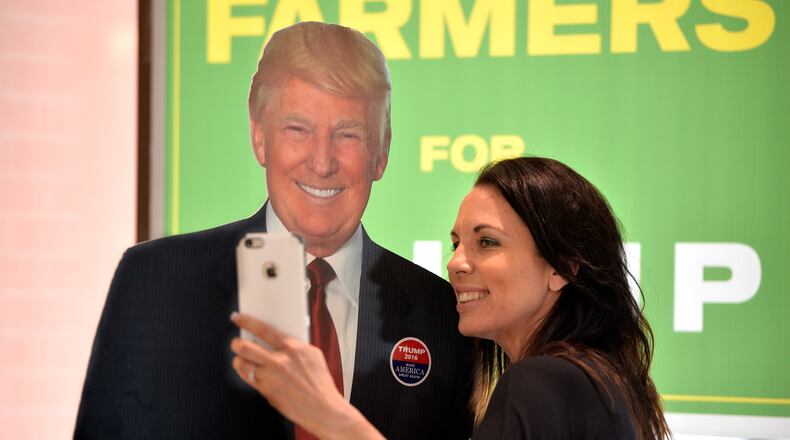The central question of the 2016 campaign wafted through the halls of the Georgia GOP Convention last weekend as distinctly as the conditioned air pumped out of ducts and vents: Is it more important to think like a Republican or to vote like one?
There's no doing both this year, not with Donald Trump atop the ticket. The man has donated to Democrats, praised single-payer health care and Clinton-era gun control, advocated higher taxes on the middle class in the form of tariffs to pursue trade "fairness," shown disregard for property rights (through an expansive notion of eminent domain) and the First Amendment (through a limited notion of freedom of the press) -- and that's the short list. He flies the Republican standard as a flag of convenience.
Still, every other candidate to carry the party's banner lost. A month after the field cleared for Trump, the Georgia Republicans assembled in Augusta still seemed at pains to reconcile themselves to the fact.
Not all of them, of course. There was plenty of Trump enthusiasm to be found among the delegates and in the vendor area, complete with the bust of The Donald from Trump's Georgia HQ.
But others, including many of those Republicans prominent enough to get a speaking slot on stage, were more circumspect. Some of them simply referred to backing "the nominee." Many opted for elision, playing up the problems wrought by the Obama presidency and the potential for worse from Hillary Clinton in lieu of forceful arguments for Trump himself. This appears to be the template for "rally 'round the flag" speeches from now till November.
Even one of Trump's most vocal supporters within the Georgia GOP establishment, Sen. David Perdue, who paired a red "Make America Great Again" hat with his own "outsider" label jean jacket, sounded less than fully sold on Trump as Trump.
"I don't know if he's conservative or not," Perdue told a group of Young Republicans, "but I know he's more conservative than Hillary Clinton."
And: "I'll have more input with him than I will with Hillary Clinton. Think about the alternative. Think about trying to have that conversation with Hillary Clinton."
And: "If Donald Trump's not conservative enough for you, fine, get over it. He's more conservative than Hillary Clinton."
After all, he flies the flag. Right?
The most popular refrain was the need to keep Clinton from appointing justices to the Supreme Court. There was near-universal agreement on this, and only slightly less agreement that Trump would be better on this score. Four years of Trump would have to be worth the decades of more favorable jurisprudence flowing from two, three, maybe four new justices, right? If, some folks cautioned, he actually sticks to the list of potential appointees his campaign floated. If ...
"If" featured in a lot of conversations. If Trump's elected, maybe he'll work with policy-minded congressmen like Speaker Paul Ryan and Georgia's Tom Price (who gave one of the more full-throated endorsements of Trump from the stage). If Trump loses, maybe he won't have done too much damage to the GOP brand along the way for the faithful to recover. If Hillary were to be elected, it would surely be worse.
And: If Trump can't find some discipline, then as George W. Bush once reportedly said, this sucker could go down.
That last one hung out there like vapor in the thick Augusta air. Well before most delegates arrived, Trump attacked the judge in (two of) his Trump University civil fraud trials as having an "inherent conflict of interest" because he is "of Mexican heritage" and Trump advocates "building a wall" on the southern border. It already had the look of a potential embarrassment for the party -- and Trump, if he's capable of feeling embarrassed. That was before Trump this week ordered surrogates to attack critics of his remarks as racists themselves, leading such prominent Republicans as U.S. Sen. Mark Kirk of Illinois and Gov. Scott Walker of Wisconsin to walk back earlier support of Trump.
Talk of a a floor fight at the national convention in Cleveland is, at this point, fanciful. Georgia Republicans fought off a challenge to the preferred slate of national delegates from a faction of Ted Cruz loyalists. It would take a lot more than comments about a judge to upend the results of months of voting and caucusing.
But if Trump continues along the same trajectory, it's easy to see a number of Republicans, in Georgia and elsewhere, deciding they'd rather abstain in November than just vote like Republicans.
If? Sorry, I meant "when."
About the Author
The Latest
Featured



